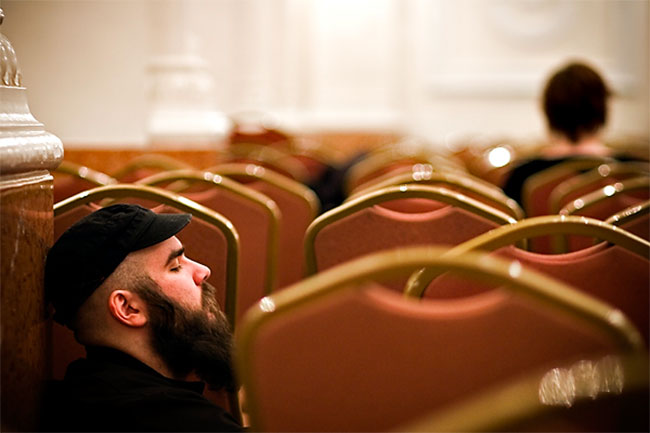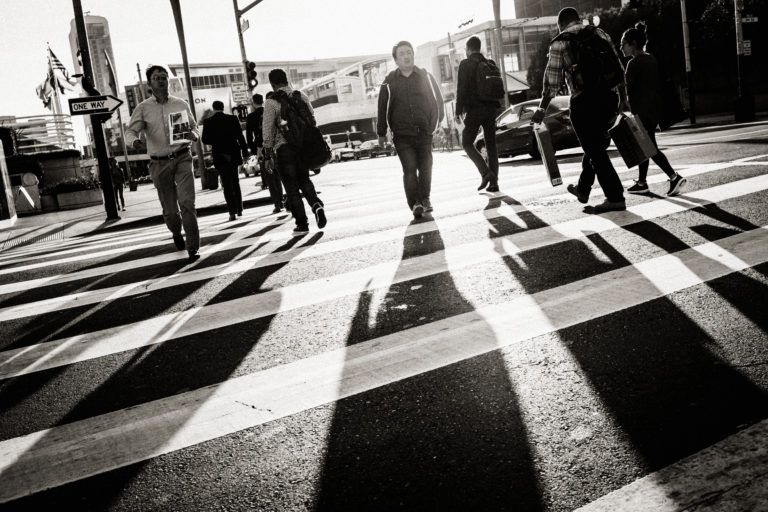
Image by Dan Alexander/Flickr, Attribution-NonCommercial-NoDerivs.
Knowing the Path, and Walking It
In the Bible, one of Jesus’s disciples asks him, “Lord, teach us to pray.”
We know that we are to pray, but we have to be taught how to pray.
As it is said by the mystical teacher Morpheus in The Matrix,
“There is a difference between knowing the path and walking the path.”
By extension, there is a difference between knowing about prayer and knowing how to pray.
As a child, I knew that I was to pray, but I didn’t know how to pray. I didn’t know about the mysteries of prayer, the heart of prayer.
When I was a teenager — a teenager living in Florida, a Muslim teenager, an Iranian teenager — I didn’t know much about Islam. I knew that we had faith in the One God of the whole cosmos. I knew that we prayed multiple times a day — or that my mother did, and the rest of us were supposed to. I knew that we didn’t drink alcohol or eat pork.
But I didn’t know about the heart of prayer.
Years later, I came to discover that I actually knew much more, had imbibed much more than what I thought I knew. I came to see that the faith of my ancestors was so all around me that I couldn’t see it. The faith of my father, the devotion of my mother, the tenderness of my grandfathers was like the air that sustained me, though it was invisible.
It was my mother who taught me how to pray.
It was my mother, Pouran, who taught me the first ten chapters of the Qur’an. Years later, I studied the Arabic of the Qur’an formally at university, and learned to pronounce things the way scholars do. When I am in public, and have to perform my expertise, yes, I speak that scholarly Arabic in the classical Fusha pronunciation. But back at home, when I am whispering my intimate prayers to the Divine Beloved, I pray as my mother does, in that Persian pronunciation.
“Besmellaahe rahmaan-e Rahim
Alhamdo lellahe rabbel aalamin. …
va lazaaleen.”
But it is about more, much more than pronunciation of words. The heart of prayer is about praying in the heart.
Anyone can stand and bow down with their limbs. Anyone can memorize a few words to utter with their mouth. Real prayer is in the heart, from the heart, where the Divine Beloved is to be both sought and found.
Faith is about more than simply the beliefs that we have. Faith is also about rituals, discipline, community, and transformation. Faith is also about seeing my mother step aside from family activity to be with God. Faith is also about seeing her be with her Beloved multiple times a day.
And faith is also about the heart of prayer. The inner mysteries of prayer.
Here are a few things I have learned about the heart of prayer. The great Rumi tells us:
Someone asked: “What is greater than prayer?”
Rumi said: “The soul of prayer is greater than prayer.”— Rumi, Fihi ma fihi
This heart of prayer,
this soul of prayer,
this prayer of the heart
is what is greater than prayer itself.
This heart of prayer is shared in every tradition, though it takes on different forms. Rumi goes on to say:
“While the prayer of every religion is each quite different, still, faith does not change from religion to religion.”
So how do the prayers of Muslims show this heart of prayer?
The prayers in Islam are not a series of requests. It is not the fast food drive-through “I’d like some of this, and some of that on the side.”
It is, instead, an adoration. It is about being with the Beloved and witnessing. When you love someone, you want to be with them. That is the heart of prayer.
Many know that Muslims pray at different times of the day: prior to sunrise, at noon, in the afternoon, right after sunset, and late at night. Those who aspire towards sanctity, of course, pray without ceasing. It does not mean that they stay in a mosque or on a prayer mat the whole day. No, their walking, bowing down, working, love-making, smiling, service, all becomes immersed in the heart of prayer.
But how does the very form of prayer lead us to the heart of prayer?
Each of the Muslim prayers consists of a few cycles. Each cycle consists of a series of standing up, bowing down (hands on knees), and prostration by putting your head on the ground.
Here is the mystery behind prayers. In the prayers, we move from standing up to prostration. We have to learn both, master both, live in both, breathe in both.
The standing up represents our quality of standing in majesty, representing all of creation. In the standing position, we utter the opening chapter of the Qur’an, which begins with:
We begin in the Name of God
Everlasting Mercy, Infinite Compassion.Praise be to God
Loving Lord of all the worlds.Everlasting Mercy
Infinite Compassion.Eternal Strength of every living being,
Whose Majestic Power embraces us on the day of the great Return.
Even if we are one person praying, we pray in the “We” voice.
“We begin in the Name of God
Everlasting Mercy, Infinite Compassion.”
This is because when we are in prayer, we are never alone.
We pray with trees,
we pray with every cloud,
every river,
every mountain.
We pray not even as Muslims,
but on behalf of whole humanity.
In standing up, our body forms the number one, a reminder of the Oneness of God. It also forms, in Arabic, the letter alef (the equivalent of “A,” the first letter of alphabet), which begins both Allah and the word insan (“human being”). So we as human beings have our origin in God, and our return is to God.
How lovely to be this majestic!
How luminous to be human!
How beautiful, how made in God’s own image, with 70,000 years of divine glances for each and every single one of us.
And yet, this luminous station is not a place that we can operate from exclusively. If we did, surely we would turn into arrogant beings. We also have to learn humility. We also have to remember that without the Divine, we are nothing.
We are no thing, for every thing and every one has its origin in God.
So we bow.
The same head that we hold high in pride, we lower.
So we prostrate ourselves, taking the head that would wear the crown of majesty and putting it on the same dirt that we come from.
But we cannot be simply dirt. We are not merely humility and nothingness. There is also joy and majesty and honor that come from bearing the crown jewel of the cosmos: Divine spirit.
This is why each and every single child matters, because each of us is a living, walking, breathing receptacle of Divine breath.
So we stand, and we bow.
We are majestic, and we are nothing.
We are spirit, and we are dirt.
We are the representative of the Lord of the Cosmos, and we are nothing.
We pray, therefore we are.
Let us seek the heart of prayer.
Yes, Lord, teach us how to pray.
Teach us the heart of prayer.
Teach us the prayer of the heart.

